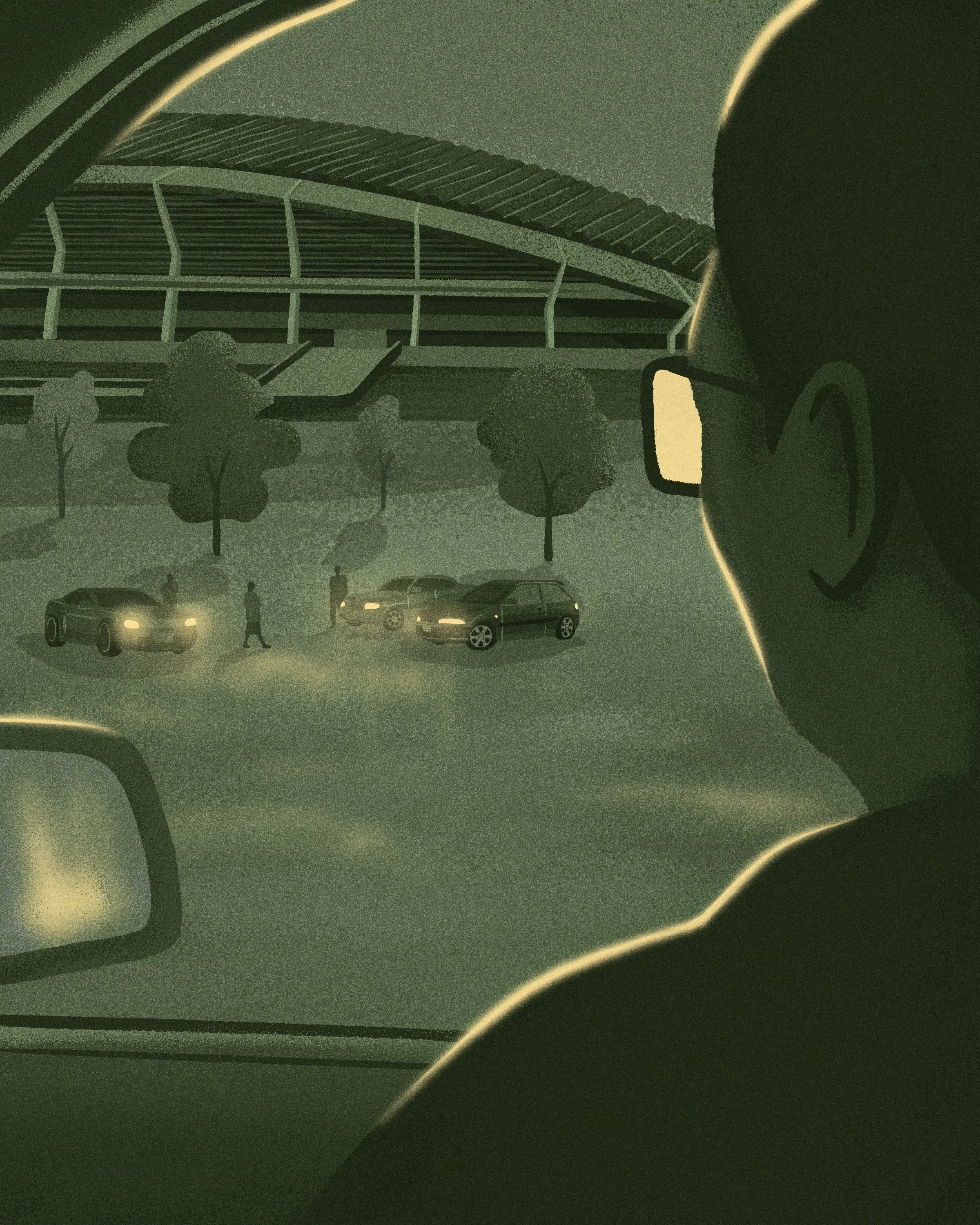ILLUSTRATION: PAPERLILY STUDIOS
The Stadium
Wan Phing Lim
In an abandoned car park outside the Shah Alam stadium, racers met on a Saturday night to spin the doughnut and practise their drifting. The stifling heat of the city—built around a valley criss-crossed with soiled rivers—pushed the school leavers out of their homes and into the open air. They longed to escape the polluted basin, but were now part of the problem too, excreting fumes and gleeful shouts from their winded-down windows.
Roslan Ahmad sat in his car watching the teenagers. If cops loved to sit alone in their vehicles, drinking coffee and eating doughnuts like in American films, then Roslan had found himself becoming the stereotype. The stadium was a grey circular building. It stood aloof, reminding him of an image he had once seen on television, of a coliseum in Rome.
The abandoned and the bored. They attracted one another—this lost generation, the sampah masyarakat—bin bags of society. The abandoned had nowhere to go, for every month in every town in Malaysia, a white elephant is born, the children of government tenders and greedy developers. Racers met in these locations, utilised every corner and gravel path, and veered into moving targets for the authorities. The teenagers were bored. Roslan was bored. They had nowhere to go.
A stalled Proton Satria kicked up the gravel, shooting sand and soot from its rear while a siren’s scream pierced the night. From his location on a slight hill, Roslan had a bird’s eye view. Thirteen cars in total, a mix of sedans, coupés and pickup trucks. Some local, some Japanese. Mostly boys, and a few token females who played grid girls.
Roslan bided his time, but already the belt and holster were itching at the waistline. Sweating in the night air, he couldn’t risk turning on the engine and air-conditioning. He looked into his binoculars again to see the rising dust of swirling doughnuts, stationary burnouts and even an attempted ski by a pickup truck—what a playground for young friends! Oh, the joy of youth.
The police badges and baton were easy to find. A friend of a friend had worked on a movie set and loaned him the full gear. He hadn’t needed to answer any questions. A wink back and an all-knowing nod did the trick. A little bit of fun in the bedroom with the bini, the wife, though he had none. Roslan was bujang. He grimaced at the word, for it sounded barren and bald. Ros was none of those. The binoculars came from the bird-watcher’s society, a brief hobby. Teenagers were more fun to look at.
— —
Mr Chong was a man of very few opinions—in his opinion—but if he had one, it was that women should not be allowed behind the wheel. Just yesterday he had read in the papers of a woman who had stepped on her accelerator instead of her brakes, killing another.
In fact, his own wife Amelia had once grazed the bottom of their Alfa Romeo after an argument. Clearly, emotions affected a woman’s coordination. Thirdly, his daughter Jamie, was now dating a glorified rempit named Luqman who drove a monster truck. When the four-wheeler arrived by the front gate, its gargantuan rubber wheels had reached even Mr Chong’s waistline, and the thought of Jamie in that tank should make him feel safe but it certainly hadn’t.
Chong tapped the steering wheel of his Volvo, a habit when thinking on the road. The Shah Alam stadium loomed ahead, a white elephant he detested seeing, for he had played a part in building it during his time at CKH Engineering. Those days were over, he thought, and the headaches too. The stadium was a landmark he wished never to see again. But this was his daily route home from work, and how was he to avoid it unless he took a different road?
The more you avoided a thing, the more power it had over you. Wasn’t that what the minister had preached on Sunday? Bring thy sins out into the light. Walk into the light as He is in the light. The stadium was a standing monument of his shame and failure—and Chong felt a heavy gloom come over him as the dusky silhouette neared. A failure in integrity, as he allowed the monies to be transferred to an anonymous recipient—anonymous only because he did not want to know. The more he knew, the greater his guilt. How was he to tell Amelia or Jamie; never, of course. One kept business and home life separate.
But tonight, Chong could take it no more. Those days were over, he thought, for he had moved onto environmental consulting—an advisory role where one need only dish out recommendations without the blood staining one’s hands. Chong signalled to turn into Shah Alam stadium. He would face this past failure, man to monument.
— —
Jamie turned the wheels of the Triton as she neared the north-west corner. All she needed to do was to avoid the beams propping the derelict stadium up, though a bang or two might not damage the pickup all that much, for she had not gotten used to driving with a tail yet.
“Careful!” Luqman shouted from the passenger’s seat. Jamie laughed, but kept her eyes on the road. She had moved away from her teammates’ playground at the open air car park. Some were still practising their doughnuts, but now she wanted to try a drift, and then a ski around the oval-shaped stadium.
Family. They weren’t a big one. Not yet. There was no Dom Toretto among them, no Brian O’Conner either, though if they ever smelt an undercover, they would hunt the rat down to the borders of Singapore or up to Thailand. Theirs was a loose brotherhood, made up of some ten or so school leavers and their tag-along girlfriends, now that the exams were over, wanting to try out a few tricks and race down a few tracks. But of late Luq was becoming a bore.
“Your father thinks I’m the thug, but you’re the bad influence,” Luq said, left hand on the grab handle.
“As long as he thinks the car is yours, he’ll never guess,” she said, heading towards a ramp.
“I know what you’re doing. Don’t try the ski tonight.”
“If not tonight, then when?” She screeched to a stop. “Then get out of my car. I mean, your car.”
Luq opened the door. “You’re crazy!” he said. “Go get yourself killed. And you’re paying for all the repairs.”
“If I die, I won’t have to pay for anything.” Jamie left him and headed for the slope, planks of wood on a muddy incline. This was no different from skateboarding, except that she now needed less of her body weight and more of the truck’s aerodynamic tail. Control, control, control. The trick was to keep the speed below 65 kilometres an hour. Hit the ramp, steer left. Eyes on the horizon.
If not tonight, then when?, she thought, watching Luq’s figure move to the corner in a slow, sulking fashion towards an approaching one, an older man she knew could not be part of their group.
— —
Before the storm lashed, the air was pregnant, unseen yet heavy, waiting to break water. Roslan could take the night heat no longer and got out of his car, police badge at the ready to poke around and see what he could do with his newfound power.
He had loved watching the children destroy themselves with dangerous stunts. Some evidently had money, and that was what he told himself he was here for. But more than pocketing a bit of cash, Ros wanted to see the terror on their faces and the fear in their eyes. One needn’t be poor to be crazy.
He spotted his first and easiest victim, a sheep astray from its flock. A boy sat alone on a grassy slope watching his friends sliding, swerving and skidding. Weren’t these just glorified rempits, with modified engines in four-wheelers instead of two? Oh, the power he had to wield.
“Hey, you!” He removed his baton and pointed it at the boy. The boy tried to run, but Ros was faster. He pinned the boy down with his weight, cuffed his hands, reached down and squeezed the boy’s buttocks, pretending to grope for keys, phones, a wallet or better still, drugs. Tonight, he really was a cop; so expertly had he worked the metal handcuffs.
The boy shouted but his companions did not come. Some drove away quickly, exiting the stadium gates. Ros pulled out a packet of ketum leaves from his trouser pocket and showed it to the boy.
“What’s this?” he demanded.
“I don’t know!” the boy shouted. “It’s not mine.”
“Not yours?” Ros said, pushing his face against the boy’s head to smell his matted hair. “You’re a liar, boy. You’re going to jail.”
The boy screamed some more, and Ros pushed his head deeper into the grassy slope to muffle the noise. The rain had finally arrived on cue. Ros laughed, and was about to remove the boy’s trousers when headlights blinded him. He shielded his eyes instinctively with his hands.
— —
Bring thy sins out into the light. Chong sat in horror as he saw two figures on the mound, his windshield wipers blurring and clearing the scene. What were these two men doing? No… a child? This damned place be cursed—there were more sins atop his own.
Beyond them, a pickup had stopped and a girl rushed towards them. She carried something long and wide, too heavy for her frame. It was… Jamie! His daughter Jamie, his own flesh and blood! What the hell was she doing in a place like this? Before she could hit the man with it, he had knocked her to the side. Jamie fell and the wooden plank tumbled. Chong got out of the car.
“Stop!” he said, but the man was running up the slope.
“Fucking policeman, he groped me!” the boy said, turning over on his back. It was Luq, the one with the truck.
“What? Pa, what are you doing here?” Jamie shouted. “The bloody cowards! They’re all gone, every one of them.”
“Who was that man?” Chong asked.
“He said he was a policeman,” Luq said.
“No policeman runs away,” Chong said, running up the hill towards the man. The grass was soggy and his shoes squished. But it was too late. A car sped off, and he could not see the number plate in the dark. Chong trotted back to his daughter, breathing heavily and trying not to slip.
“Pa, what are you doing here?” Jamie repeated.
“What are you doing here? I came by to see the stadium. How long have you and your friends been meeting here? What is this place?”
“Shouldn’t we report that man?” Jamie said, ignoring her father. “Are you hurt, Luq?”
“No, but he frisked me, the fucking pervert. He had a baton, but no gun. He tried to plant a bag of ketum on me.”
“What? The fucker! And your wallet?” Jamie asked.
Luq patted his pockets. “It’s all here.”
“The man’s gone,” Chong said, hands on knees to catch his breath.
“What? We have to report this,” Jamie said.
“I couldn’t see the car plate. Did you get a good look at his face?”
“No,” Luq said. “I was on the ground… the whole time.”
“C’mon, let’s all get in the car. It’s pouring,” Chong said.
“What about the truck?” Jamie said.
Chong waved his hand in exhaustion and defeat. “I’ll follow on from behind. We’re going home now.”
— —
Roslan rushed past the exit, spraying water as he went. The stadium latched onto him from his rearview mirror like a displeased parent. The city was full of white elephants that were grey in colour, made up of abandoned projects, making a whole nation perpetually under construction. When left unattended for too long, the abandoned ceased to function. Rosak—broken, not working, not functioning. Rosak, like ATM machines, like public toilets. Rosak, like these children, like him.
The handcuffs had been a success, the ketum leaves even better, but wasted now in the grass. He felt for the badge, and was glad it was in his pocket. A moving target, these boys and girls. The frisking had only been to scare the boy, but tonight he had dared to pry for flesh, though it had been interrupted by the man, damn his soul. Tomorrow he would find another group, find another lone sheep. He had other costumes too. His favourite was the long garb and the skullcap.
Wan Phing Lim was born to Malaysian parents in 1986 in Butterworth, Penang. Her short stories have appeared in Catapult, Ricepaper Magazine, Sine Theta Magazine, Kyoto Journal and more. She lives in Penang and ‘Two Figures in a Car’ (Penguin SEA, 2021) is her first short story collection.




